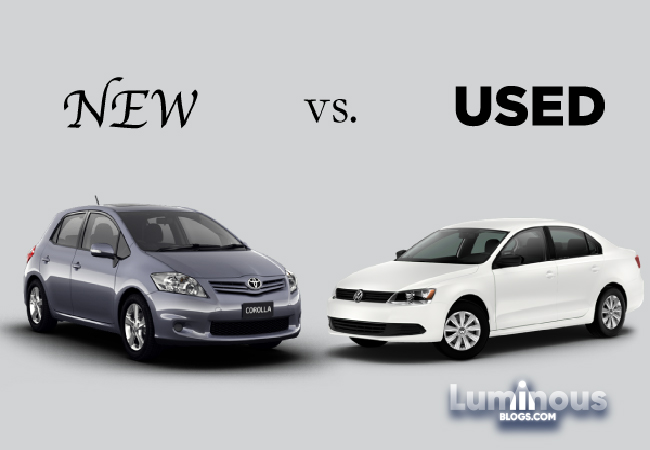
New vs. Used: A Buyer's Guide to Automobiles
When it comes to buying a car, one of the most significant decisions you'll face is whether to purchase a new or used vehicle. Both options have their advantages and drawbacks, and making the right choice depends on your individual needs, preferences, and budget. In this comprehensive buyer's guide, we'll explore the pros and cons of buying new and used cars, helping you make an informed decision on your next automotive investment.
Buying a New Car: The Pros
Latest Features: One of the most significant advantages of buying a new car is access to the latest automotive features, technology, and safety advancements. New cars often come equipped with cutting-edge infotainment systems, advanced driver-assistance features, and improved fuel efficiency.
Reliability: New cars typically have a lower likelihood of immediate maintenance issues and repairs, thanks to their factory warranty coverage. You can drive with peace of mind, knowing that you won't have to shoulder unexpected repair costs.
Financing Rates: Automakers and dealerships often offer attractive financing rates and incentives for new car purchases, including low or even zero percent APR financing. These deals can make new cars more affordable in the long run.
Resale Value: New cars tend to hold their value well in the first few years, and some may even appreciate in value, particularly if they are limited-production or special-edition models.
Buying a New Car: The Cons
Higher Initial Cost: New cars are more expensive than their used counterparts. The premium price tag can be a significant deterrent, especially if you're on a tight budget.
Depreciation: New cars experience rapid depreciation in the first few years, losing a substantial portion of their value. This can lead to a financial loss if you decide to sell the car soon after purchase.
Insurance Costs: Insurance premiums are typically higher for new cars due to their higher replacement value. This can add to the overall cost of ownership.
Limited Variety: New cars may offer limited variety in terms of makes, models, and options. If you're looking for a specific model or feature that's no longer in production, you may need to consider a used vehicle.
More Tax and Fees: New cars often come with higher sales tax and registration fees, increasing the upfront costs of ownership.
Buying a Used Car: The Pros
Lower Initial Cost: Used cars are more affordable upfront, making them a budget-friendly option for many buyers. You can often get more for your money when purchasing a used vehicle.
Slower Depreciation: Used cars have already experienced their steepest depreciation, which means they tend to lose value at a slower rate than new cars. This can result in better long-term value retention.
More Variety: The used car market offers a wide range of makes, models, and options, including older models that may no longer be in production. This variety can help you find the car that best suits your preferences and needs.
Lower Insurance Costs: Insurance premiums for used cars are generally lower, saving you money on your monthly expenses.
Proven Reliability: Many used cars have a track record of reliability, which can provide assurance that you're purchasing a vehicle with a history of dependable performance.
Buying a Used Car: The Cons
Uncertain History: Used cars may have a history that includes accidents, poor maintenance, or hidden issues that aren't immediately evident. A comprehensive vehicle history report is essential to reveal the car's past.
Limited Warranty: Most used cars no longer have the manufacturer's warranty, which means you may need to cover repair and maintenance costs out of pocket. Consider purchasing an extended warranty for added protection.
Older Technology: Older models may lack the latest automotive features and technology, including advanced safety systems and infotainment options.
Potential Repairs: Due to their age and mileage, used cars may require more frequent maintenance and repairs, which can add to the cost of ownership.
Finding the Right Balance: Certified Pre-Owned (CPO) Cars
Certified pre-owned cars offer a middle ground between new and used vehicles, combining the benefits of both:
Warranty Coverage: CPO cars often come with extended manufacturer warranties, providing additional peace of mind.
Thorough Inspections: Certified pre-owned vehicles undergo rigorous inspections and refurbishing processes to ensure they meet specific quality standards.
Lower Depreciation: While CPO cars are more expensive than typical used cars, they still tend to experience slower depreciation than new vehicles.
Limited Selection: The availability of CPO cars may be more limited than standard used cars, and they often come from specific manufacturers.
Questions to Consider
When deciding between new and used cars, ask yourself these essential questions:
What's My Budget?: Determine how much you're willing to spend, both on the initial purchase and long-term ownership.
How Long Do I Plan to Keep the Car?: Consider your long-term plans. If you intend to keep the vehicle for many years, the rapid depreciation of a new car may be less concerning.
What Features Are Important to Me?: Decide which features and technology you consider essential and whether you're willing to compromise on the latest advancements.
Do I Have a Preferred Make or Model?: If you have a specific make or model in mind, your decision may be influenced by its availability in the new or used market.
What's My Tolerance for Maintenance and Repairs?: Assess your willingness to handle maintenance and potential repairs. If you prefer a hassle-free ownership experience, a new car may be the better choice.
Research and Inspections
Regardless of your choice, thorough research and inspections are vital. When buying a new car, compare prices, financing rates, and incentives among dealerships. For used and CPO cars, request a vehicle history report, have the car inspected by a trusted mechanic, and carefully review maintenance records.
Negotiation Skills
Develop strong negotiation skills to ensure you're getting the best deal, whether it's on the purchase price of a new car or during the haggling process when buying a used vehicle.
Financing Options
Explore financing options and choose the one that suits your budget. You can secure a loan from your bank, a credit union, or the dealership. Be sure to compare interest rates, terms, and monthly payments.
Test Drive and Evaluation
Always test drive the car you're considering. Pay close attention to its performance, handling, and overall comfort. Ask about the car's history, including any accidents or maintenance issues.
Ownership Costs
Remember to consider the long-term ownership costs, including insurance, fuel, taxes, and registration fees. These expenses can significantly impact your budget.
The Decision Is Yours
Ultimately, the decision to buy a new or used car should align with your financial situation, driving needs, and personal preferences. Both new and used cars offer their unique advantages, so it's crucial to weight the pros and cons carefully. Take your time, research thoroughly, and make a choice that suits your lifestyle and budget. Whether you're driving off the lot in a brand-new car or finding value in a well-maintained used vehicle, the goal is to find a car that meets your needs and leaves you with a satisfied smile behind the wheel


